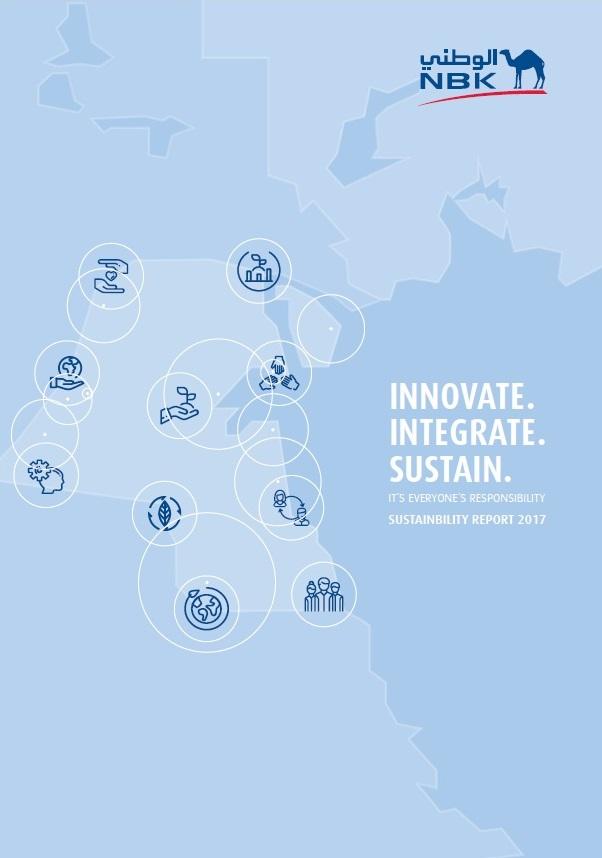National Bank of Kuwait Takes Extensive Steps Towards Becoming a Middle East Corporate Sustainability Leader

Kuwait City – The National Bank of Kuwait (NBK) launched its second annual Sustainability Report today, the first ever to be in alignment with the guidelines from the Kuwait National Development Plan (KNDP), the Global Reporting Initiative (GRI), the United Nations Sustainable Development Goals (UNSDG), and the Boursa Kuwait voluntary sustainability disclosure guide.
Being in alignment with these four major sets of standards – the national guidelines of Boursa Kuwait and the Kuwait National Development Plan, along with GRI G4 reporting framework, the de facto international standard for corporate social responsibility reporting, as well as the United Nations goals for sustainable development – reflects the seriousness of NBK’s commitment to pursuing sustainability at the highest levels of practice in the world. The Boursa Kuwait guide is also aligned with the recommendations of the Sustainable Stock Exchanges Initiative (SSEI) and the World Federation of Exchanges (WFE).
After 9 years of reporting about their corporate social responsibility (CSR) and philanthropic and community activities, last year NBK initiated a new, more comprehensive approach to sustainability and ESG (Environment, Social and Governance). This second Sustainability Report highlights the extensive steps NBK has taken toward becoming a Middle East corporate sustainability leader.
NBK’s Chairman of the Board, Nasser Musaed Al-Sayer, provided an overview of their increasingly sophisticated approach to sustainability: “In 2016, we identified our key social, economic, and environmental aspects and integrated them in service of creating long-term value. Taking a monumental leap forward, this year we developed comprehensive sustainability strategy mapping to integrate our key innovative ideas into our core business strategy and operational practices.”
NBK views sustainability as critical to our ability to create innovative products and services and to successfully compete nationally and globally. We are committed to becoming a leading advocate of and a national exemplar in sustainability practices.
Nasser Musaed Al-Sayer
Chairman of the NBK Board of Directors
NBK conducted a broad range of engagement initiatives with their major stakeholders – including surveys, partnerships, reports, meetings, environmental projects, and intensive dialogue sessions – to develop an exhaustive Materiality Matrix of their sustainability priorities, 31 in all categorized into High, Medium, and Low priority. Then utilizing multiple workshops with executive leaders, NBK systematically mapped those priorities into a sweeping 5-Year Roadmap that includes short-, medium- and long-term goals and milestones. The second Sustainability Report published today details this comprehensive approach and highlights NBK’s current performance and progress thus far. The six sustainability-focused priority areas, with illustrative results as reported today, include:
Serving Customers
NBK’s overall customer satisfaction score reached a new record of 93% in 2017, a 2% increase from 2016. The report summarizes NBK’s management systems for assuring quality of service, customer privacy and data security, effective risk management, and accessibility and services for customers with special needs.
Leading in Business & Governance
NBK invested in digitized innovative new products and services, along with comprehensive corporate governance structures, processes, and culture.
Caring for the Environment
NBK created 33% less material throughput last year due to digitization efforts – and recycled over 115 tons of paper. The company continues investment in a new, LEED Gold-certified headquarters building, incorporating sustainability considerations into its construction and design for more energy- and water-efficient operations.
Giving Back to the Community
Continuing their decades of financial contributions to the advancement of healthcare, NBK donated over $22 million USD to develop the Stem Cell Therapy Unit at NBK Children’s Specialty Hospital, the largest project ever supported by a private sector organization in Kuwait, which provided treatment to more than 900 children with leukemia and cancer in 2017.
Respecting & Developing People
As part of its commitment to building a respectful, competent, customer-centric workforce, NBK provided more than 68,000 training hours in over 80 offerings for NBK employees in 2017.
Contributing to Sustainable Economic Development
In close, collaborative alignment with the Kuwait National Development Plan (KNDP), NBK has been playing a primary role as the Kuwaiti government’s financial partner in major sustainability-related projects. Projects newly underway include clean fuel refinery upgrades, solar energy projects, a waste-to-energy incinerator, wastewater treatment plants, innovative solid waste management public-private partnership projects, housing provision, seawater desalination plants, and hospital construction.
About NBK:
Founded in Kuwait City in 1952, the National Bank of Kuwait (NBK) is the country’s longest-serving local bank – and the first shareholding company in Kuwait and the Gulf Cooperation Council. Over 65 years, NBK has established itself as Kuwait’s leading financial institution. Today, NBK has more than 140 branches in 15 countries across 4 continents. NBK’s market capitalization as of 31 December 2017 was USD 14.0 billion. NBK’s main operational focus is the Middle East and North Africa (MENA) region. NBK also has an important presence in China, France, Singapore, Switzerland, Turkey, the United Kingdom, and the United States.
The full 2017 NBK Sustainability Report can be found at: nbk.com/nbk-group/our-approach/sustainability
The 2017 NBK Annual report can be found at: nbk.com/nbk-group/investor-relations/financial-reports
NBK on Twitter: https://twitter.com/NBKPage
For additional information about NBK’s sustainability work, please contact:
sustainability@nbk.com Tel: (965) 22592665

